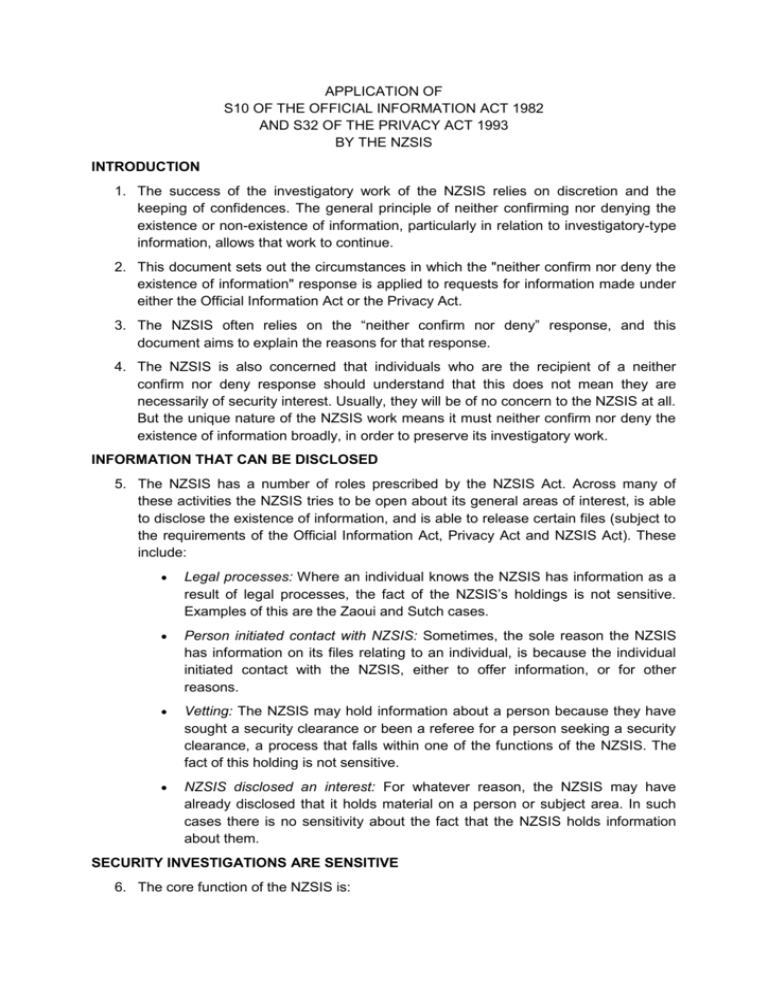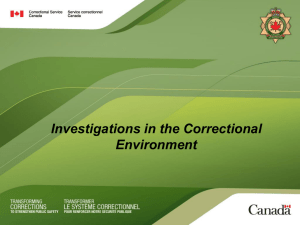click here - New Zealand Security Intelligence Service
advertisement

APPLICATION OF S10 OF THE OFFICIAL INFORMATION ACT 1982 AND S32 OF THE PRIVACY ACT 1993 BY THE NZSIS INTRODUCTION 1. The success of the investigatory work of the NZSIS relies on discretion and the keeping of confidences. The general principle of neither confirming nor denying the existence or non-existence of information, particularly in relation to investigatory-type information, allows that work to continue. 2. This document sets out the circumstances in which the "neither confirm nor deny the existence of information" response is applied to requests for information made under either the Official Information Act or the Privacy Act. 3. The NZSIS often relies on the “neither confirm nor deny” response, and this document aims to explain the reasons for that response. 4. The NZSIS is also concerned that individuals who are the recipient of a neither confirm nor deny response should understand that this does not mean they are necessarily of security interest. Usually, they will be of no concern to the NZSIS at all. But the unique nature of the NZSIS work means it must neither confirm nor deny the existence of information broadly, in order to preserve its investigatory work. INFORMATION THAT CAN BE DISCLOSED 5. The NZSIS has a number of roles prescribed by the NZSIS Act. Across many of these activities the NZSIS tries to be open about its general areas of interest, is able to disclose the existence of information, and is able to release certain files (subject to the requirements of the Official Information Act, Privacy Act and NZSIS Act). These include: Legal processes: Where an individual knows the NZSIS has information as a result of legal processes, the fact of the NZSIS’s holdings is not sensitive. Examples of this are the Zaoui and Sutch cases. Person initiated contact with NZSIS: Sometimes, the sole reason the NZSIS has information on its files relating to an individual, is because the individual initiated contact with the NZSIS, either to offer information, or for other reasons. Vetting: The NZSIS may hold information about a person because they have sought a security clearance or been a referee for a person seeking a security clearance, a process that falls within one of the functions of the NZSIS. The fact of this holding is not sensitive. NZSIS disclosed an interest: For whatever reason, the NZSIS may have already disclosed that it holds material on a person or subject area. In such cases there is no sensitivity about the fact that the NZSIS holds information about them. SECURITY INVESTIGATIONS ARE SENSITIVE 6. The core function of the NZSIS is: "To obtain, correlate, and evaluate intelligence relevant to security, and communicate any such intelligence to such persons, and in such manner, as the Director considers to be in the interests of security." 7. The work of the NZSIS protects national security and advances New Zealand’s interests. Such work includes: Safeguarding New Zealand from the actions of foreign powers that might otherwise damage the interests of New Zealand. Preventing the potential facilitation of terrorists acts both in New Zealand and overseas. Preventing the spread of weapons of mass destruction. 8. The NZSIS operates in a unique environment, which poses particular challenges for investigatory work. 9. Security investigations are long-term in nature. Partly, this is related to the nature of its subjects, many of whom think and plan long-term. Often, they have undertaken specialist training to learn how to conceal their activities. It can require long lead time on the part of the NZSIS to gain access to information about such subjects. 10. Security intelligence investigations also have a longer life than law enforcement investigations. The latter are typically brought to a close by the laying of charges. But that is not the case for the NZSIS which is not an enforcement authority. For the NZSIS, the closing of an investigation does not mean that the investigation is no longer sensitive. 11. NZSIS investigations are also prospective in nature, with the primary emphasis on prevention. The NZSIS will often need to preserve its position as to whether material may be relevant in the future. 12. The NZSIS collects intelligence from human sources and by visual and technical surveillance. These sources and methods are used covertly so as not to reveal investigations and to allow the NZSIS to access intelligence that would not otherwise be available. DISCLOSURE CAN PREJUDICE SECURITY 13. In some cases, general areas of investigation can be disclosed in the unclassified website. However, in the case of specific investigations, both collection methods and investigative effectiveness would be compromised if the subjects of investigation knew when and how such techniques were being deployed. 14. Effectively, a request for information to the NZSIS is tantamount to asking whether there is or has been an investigation by the NZSIS into the individual or the subject matter. The NZSIS is particularly susceptible to orchestrated requests by people who are seeking to know whether they are under investigation. 15. As well as protecting security investigations, the NZSIS needs to protect its reputation and its ability to keep confidences. Disclosing information that would lead to the disclosure of the existence of a source would affect people’s safety and be contrary to the public interest, because it would likely impact on all sources’ expectations of confidence in dealing with the NZSIS. 16. Security concerns about individuals or subjects may lessen over time, but not in all cases. At best, the passage of time will be relevant as to reduced sensitivity, but ultimately a judgement needs to be made about sensitivity (in terms of prejudice to security) and the likely consequences of disclosure at the time the request is made. THE PROBLEM WITH CONFIRMING THAT NO INFORMATION IS HELD 17. It would seem straightforward that if no information is held, a reply confirming the non-existence of information could be provided without fear of likely prejudice to security. 18. Unfortunately, such an approach would be likely to prejudice security as: It discloses what the NZSIS does not know. It leaves the NZSIS open to orchestrated requests designed to flush out specific areas of investigation. 19. There are two principal concerns associated with confirming that no information is held: Not knowing whether the NZSIS is investigating a particular activity or not has something of a deterrent effect. If it becomes a simple exercise to identify what is not of interest to the NZSIS, the benefit of the deterrent effect is lost. If a correspondent is undertaking activities of security concern, and receives a “no information held” response for a subject they believed should be under investigation, they now know they have not been detected. 20. Unfortunately, the NZSIS is a natural target for orchestrated requests by some persons of security concern or their associates who want to understand more about the NZSIS’ specific areas of investigation. 21. The only way to ensure that there is no prejudice to security is to be consistent in responses between these two groups (i.e. subjects of interest and subjects of no interest), and to issue a "neither confirm nor deny" response for both. LEGAL PROTECTIONS 22. New Zealand legislation anticipates that special protection will be given to NZSIS information, including: Section 12A of the NZSIS Act which prevents any officer or employee of the NZSIS from disclosing any information obtained through their connection with the NZSIS otherwise than in the strict course of official duties or as authorised by the Minister. Section 13A of the NZSIS Act which makes it an offence for any person to publish or broadcast the fact that any person is a member of the NZSIS (other than the Director), or is connected in any way with a member of the NZSIS. Section 26 of the Inspector-General of Intelligence and Security Act 1996 which prevents the Inspector-General or any of his staff from disclosing to any person security records or other official information relating to the activities of an intelligence and security agency. SAFEGUARDS AND OVERSIGHT 23. The reliance on the “neither confirm nor deny” response may cause concerns about whether the rights of individuals are being protected. However, the NZSIS is subject to a number of safeguards and oversight arrangements. They are: Oversight by the Inspector-General of Intelligence and Security The Inspector-General, who must have held high judicial office, undertakes an annual review programme covering warrants and other statutory processes of the NZSIS. The Inspector-General can hear complaints under the terms of his Act. The Inspector-General can initiate a review of any NZSIS activity on his/her own motion and is given access to all NZSIS material. Review by the Privacy Commissioner The Privacy Act 1993 allows the Privacy Commissioner to hear complaints on neither confirm nor deny responses or the withholding of information. The Privacy Commissioner’s office reviews NZSIS files that are the subject of complaints. The NZSIS provides the Privacy Commissioner with access to all material that may be relevant. Review by the Ombudsmen The Ombudsmen has jurisdiction to consider complaints about neither confirm nor deny responses or the withholding of information. The Ombudsmen review information held by the NZSIS. The NZSIS provides the Ombudsmen’s Office with access to all material that may be relevant. Political Oversight The Minister in Charge of the NZSIS is the Prime Minister, and the NZSIS must consult regularly with the Leader of the Opposition as well. The Intelligence and Security Committee - a body of politicians that has financial and policy oversight of the intelligence and security agencies - is made up of the Prime Minister, the Leader of the Opposition, two Members of Parliament nominated by the Prime Minister and one nominated by the Leader of the Opposition. The Director of the NZSIS must ensure that the NZSIS does not take action for the purpose of furthering or harming the interests of any political party.







